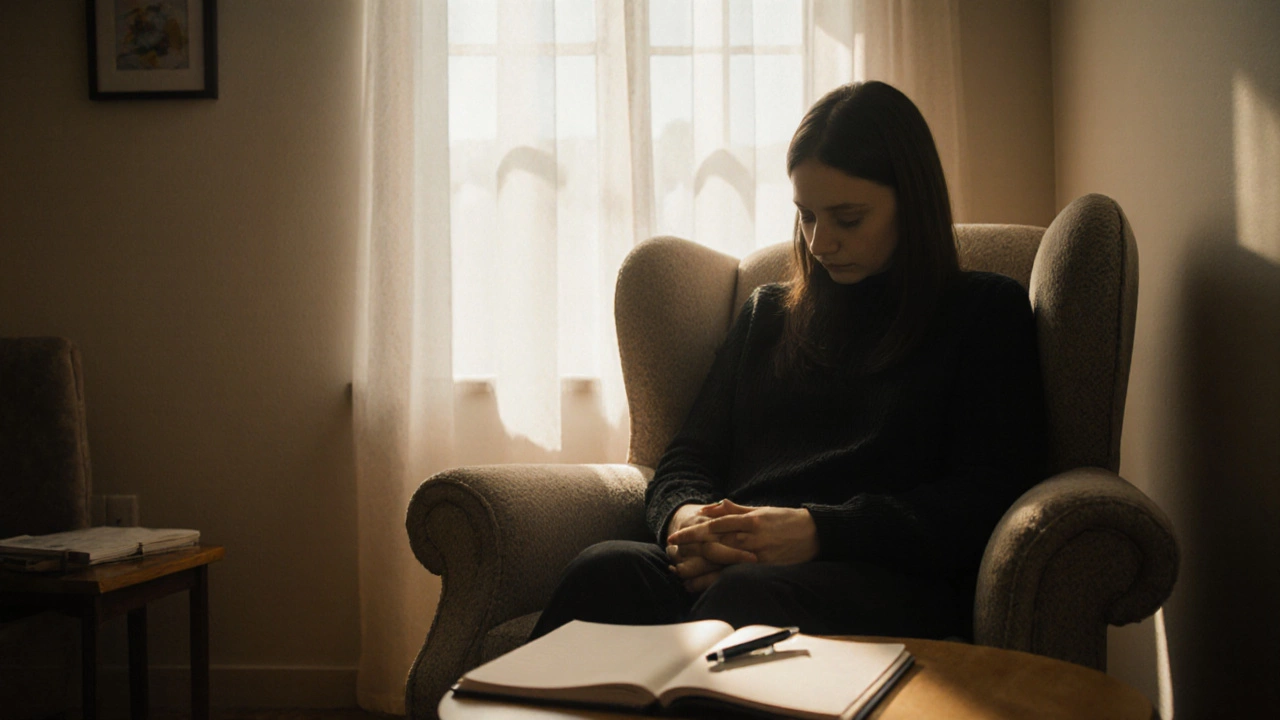Therapy Confidentiality Quiz
How Much Should You Share With Your Therapist?
Take this quick quiz to understand what's confidential and when you need to share critical information.
If you tell your therapist you're having thoughts about harming yourself, what happens?
You're struggling with current anxiety but don't want to talk about your childhood. Is this okay?
Can your therapist share your session details with your employer?
What should you do if you're not ready to share a painful memory?
You sit in the therapist’s office. The chair is soft. The lights are low. You’ve been thinking about this moment for weeks. Maybe months. You want to talk-really talk-but then it hits you: Do I have to tell my therapist everything? The fear isn’t just about shame. It’s about control. What if I say something I can’t take back? What if they judge me? What if they think I’m broken?
The truth is, you don’t have to tell your therapist everything. Not right away. Not ever, if you’re not ready. Therapy isn’t an interrogation. It’s a conversation that unfolds at your pace. And that’s by design.
Therapy Isn’t a Confession Booth
Many people imagine therapy like a religious confession: spill it all, get absolved, walk out lighter. But therapy doesn’t work that way. Therapists aren’t judges. They’re guides. Their job isn’t to collect your secrets-it’s to help you understand them.
Think of it like learning to ride a bike. You don’t start by pedaling downhill on a busy street. You start with training wheels. Then a gentle slope. Then one hand off the handlebars. Therapy is the same. You build trust slowly. You share what feels safe. And that’s enough.
A 2023 study from the American Psychological Association found that 68% of clients in their first therapy session withheld at least one significant detail-things like self-harm urges, sexual trauma, or financial shame. And guess what? Those who waited to share until they felt safe had better long-term outcomes than those who rushed.
What Happens If You Don’t Tell Everything?
Some people worry that hiding parts of their story means therapy won’t work. That’s not true. Therapy isn’t a checklist. It’s a process. You don’t need to reveal your entire life story in the first month-or even the first year.
Therapists are trained to notice what’s left unsaid. A pause. A change in tone. A shift in posture. These are clues. If you say, “I don’t get along with my dad,” and then quickly change the subject, your therapist might gently ask, “What happens when you think about your dad?” Not to pressure you. But to give you space to go deeper-if you want to.
Forcing yourself to reveal something before you’re ready can backfire. It can make you feel exposed, powerless, or even retraumatized. That’s why ethical therapists don’t push. They wait. They hold space. They let you lead.
What You Absolutely Must Tell
There are limits to confidentiality. And it’s important to know them.
If you say you plan to hurt yourself or someone else, your therapist is legally required to take action. That might mean contacting emergency services, notifying a family member, or hospitalizing you for safety. This isn’t betrayal. It’s a safety net.
Same goes for child abuse, elder abuse, or abuse of a vulnerable adult. Therapists are mandated reporters. If you disclose abuse, they must report it to authorities. This is not about judging you-it’s about protecting people who can’t protect themselves.
Outside of those situations, everything else is private. Even if you confess to stealing, cheating, lying, or doing something you’re deeply ashamed of-your therapist can’t tell anyone. Not your partner. Not your boss. Not your family. Not even another therapist without your written permission.

Why People Hold Back (And How to Move Past It)
People stay silent for many reasons:
- Shame: “I did something terrible. They’ll think I’m evil.”
- Fear of judgment: “They’ll think I’m weak, crazy, or overdramatic.”
- Belief that it’s not “bad enough”: “It’s not like I was abused. I just feel empty all the time.”
- Worry about consequences: “If I say I’m suicidal, they’ll lock me up.”
- Trust issues: “Therapists are just paid listeners. They don’t really care.”
Here’s what helps:
- Start small. Say, “There’s something I’m not ready to talk about yet, but I want to.” That’s enough.
- Write it down first. Sometimes putting words on paper makes them feel less scary.
- Ask your therapist: “Can you help me feel safer talking about this?” Most will say yes-and show you how.
- Remember: your therapist has heard it all. The weirdest, darkest, most confusing thoughts? They’ve heard them before. And they’re not shocked. They’re just glad you’re here.
Therapy Is a Relationship, Not a Report
Therapy works best when it feels like a real relationship-not a performance. You don’t have to be “fixed” to be worthy of care. You don’t have to be perfect. You don’t even have to be coherent.
Some of the most powerful moments in therapy happen when someone says, “I don’t know how to say this.” Or, “I’m scared to say it out loud.” That’s not weakness. That’s courage.
Your therapist isn’t there to fix you. They’re there to sit with you while you figure things out. And that only works if you show up-however you can, however much you can.

What If You’re Still Not Sure?
It’s okay to test the waters. Try this:
- Next session, say: “I’m not sure if I’m ready to talk about X, but I want to explore whether I ever will.”
- Notice how they respond. Do they pressure you? Do they pause? Do they say, “Take your time”? That tells you everything you need to know.
- If they push you, it’s a red flag. A good therapist respects boundaries-even the ones you haven’t fully named yet.
Therapy is a two-way street. If you don’t feel safe, you’re not obligated to stay. You can find someone else. You can take a break. You can come back later. Your healing belongs to you.
You’re Not Broken for Holding Back
There’s no prize for the person who shares the most. There’s no gold star for the one who cries the hardest or admits the most secrets.
Therapy isn’t about how much you say. It’s about how much you begin to understand. About how much you begin to trust yourself.
Some people spend years in therapy and never mention their childhood. But they learn to stop sabotaging their relationships. They learn to say no. They learn to sleep through the night. That’s healing.
Others say everything in the first session-and still struggle for years. Because healing isn’t about information. It’s about integration. It’s about feeling safe enough to hold your own pain without running from it.
You don’t have to tell your therapist everything. But if you’re ready to start telling even a little? That’s enough. That’s everything.
Do I have to tell my therapist my darkest thoughts?
No. You never have to share anything you’re not ready to. Therapists understand that trust takes time. Even if you think your thoughts are extreme or shameful, they’ve likely heard them before. The goal isn’t to confess everything-it’s to feel safe enough to explore what matters to you.
What if I lie to my therapist?
Lying is normal-especially early on. Many people lie to protect themselves, avoid judgment, or test if the therapist is safe. Therapists aren’t detectives. They’re observers. If you lie, they’ll notice the gap between what you say and how you behave. They’ll gently reflect that back-not to catch you, but to help you understand why you felt the need to hide.
Can my therapist tell my family or employer?
No, unless you’re at risk of harming yourself or others, or if you disclose abuse of a child, elder, or vulnerable adult. Outside of those rare legal exceptions, everything you say is confidential-even if you’re on insurance. Your therapist can’t share your records without your written permission.
Is it weird that I don’t want to talk about my childhood?
Not at all. Many people avoid childhood topics because they’re painful, confusing, or feel irrelevant. Therapy doesn’t require you to dig up the past. It’s about what’s affecting you now. If your current anxiety, relationships, or sleep issues don’t connect to your childhood, there’s no need to force it.
Will my therapist think less of me if I admit to something bad?
No. Therapists aren’t moral judges. They’ve heard stories of betrayal, addiction, violence, and regret. What matters to them isn’t what you did-it’s that you’re showing up, trying to understand yourself, and willing to grow. Admitting something hard is often the first step toward change.
If you’re wondering whether to speak up, ask yourself: What’s the cost of staying silent? Is it keeping you stuck? Is it making you feel more alone? If so, even a small step-like saying, “I’m not sure how to say this”-can begin to shift things. You don’t need to have it all figured out. You just need to show up. And that’s more than enough.






